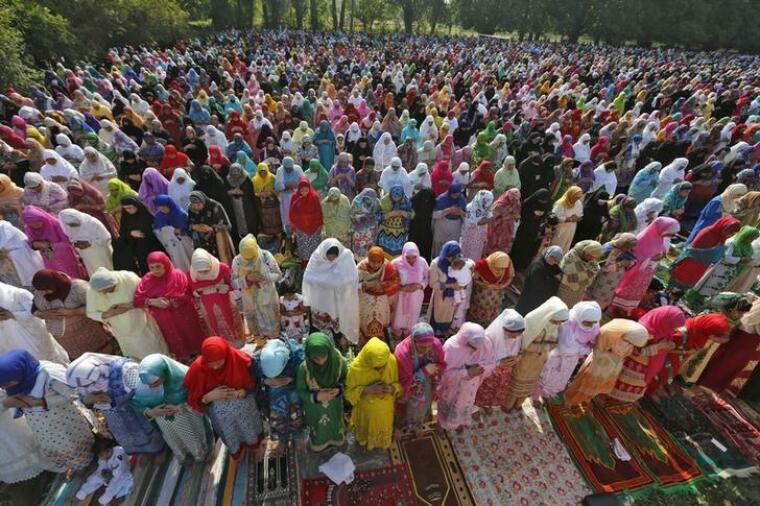Islam to overtake Christianity as world's largest religion by 2070, Pew study claims

Christianity is currently the world's largest religion, but that may soon change before the end of the century. According to a study by the Pew Research Center, the number of Muslims will soon exceed the number of Christians if current demographic trends continue.
As of 2010, Muslims comprised 1.6 billion of the world's population. The Pew Research Center estimated that by 2050, the Muslim population will have increased by 73 percent to 2.8 billion.
Islam's rapid growth is due in part to high birth rates among Muslims. The study revealed that Muslim women across the world have an average of 3.1 children, compared with 2.3 for all the other religious groups combined.
The report also indicated that followers of Islam on average are the youngest of all major religious groups, seven years younger than the median age of non-Muslims. This means that a larger number of Muslims "already are, or will soon be, at the point in their lives when they begin having children," according to Pew.
Pew's demographic projections estimated that Muslims will comprise 2.1 percent of the U.S. population by 2050, surpassing those who identify as religious Jews as the second largest faith group in the country. There are currently 3.3 million Muslims in the U.S., about one percent of the American population.
The Muslim population in Europe is also expected to have a significant increase. The polling group projected that 10 percent of its population will be Muslims by 2050.
India is projected to become the country with the world's largest Muslim population by 2050. It is expected that more than 300 million Muslims will be living in India by that year while remaining as a Hindu-majority country.
The report also revealed that most people in countries with significant Muslim populations hold an unfavorable view of the Islamic State terror group. Virtually all respondents in Lebanon and 94 percent in Jordan viewed ISIS unfavorably. In Pakistan, 64 percent of the respondents do not offer an opinion about the terror group.
Most Muslims say that suicide bombings and other forms of violence committed in the name of Islam are rarely or never justified, including 92 percent in Indonesia and 91 percent in Iraq. A 2011 survey in the U.S. indicated that 86 percent of Muslims believe that such tactics are rarely or never justified.
 Christians don't have to affirm transgenderism, but they can’t express that view at work: tribunal
Christians don't have to affirm transgenderism, but they can’t express that view at work: tribunal Archaeology discovery: Medieval Christian prayer beads found on Holy Island
Archaeology discovery: Medieval Christian prayer beads found on Holy Island Presbyterian Church in America votes to leave National Association of Evangelicals
Presbyterian Church in America votes to leave National Association of Evangelicals Over 50 killed in 'vile and satanic' attack at Nigerian church on Pentecost Sunday
Over 50 killed in 'vile and satanic' attack at Nigerian church on Pentecost Sunday Ukrainian Orthodox Church severs ties with Moscow over Patriarch Kirill's support for Putin's war
Ukrainian Orthodox Church severs ties with Moscow over Patriarch Kirill's support for Putin's war Islamic State kills 20 Nigerian Christians as revenge for US airstrike
Islamic State kills 20 Nigerian Christians as revenge for US airstrike Man who served 33 years in prison for murder leads inmates to Christ
Man who served 33 years in prison for murder leads inmates to Christ


 Nigerian student beaten to death, body burned over ‘blasphemous’ WhatsApp message
Nigerian student beaten to death, body burned over ‘blasphemous’ WhatsApp message 'A new low': World reacts after Hong Kong arrests 90-year-old Cardinal Joseph Zen
'A new low': World reacts after Hong Kong arrests 90-year-old Cardinal Joseph Zen Iran sentences Christian man to 10 years in prison for hosting house church worship gathering
Iran sentences Christian man to 10 years in prison for hosting house church worship gathering French Guyana: Pastor shot dead, church set on fire after meeting delegation of Evangelicals
French Guyana: Pastor shot dead, church set on fire after meeting delegation of Evangelicals ‘Talking Jesus’ report finds only 6% of UK adults identify as practicing Christians
‘Talking Jesus’ report finds only 6% of UK adults identify as practicing Christians Mission Eurasia ministry center blown up in Ukraine, hundreds of Bibles destroyed: 'God will provide'
Mission Eurasia ministry center blown up in Ukraine, hundreds of Bibles destroyed: 'God will provide' Church holds service for first time after ISIS desecrated it 8 years ago
Church holds service for first time after ISIS desecrated it 8 years ago Burger King apologizes for 'offensive campaign' using Jesus' words at the Last Supper
Burger King apologizes for 'offensive campaign' using Jesus' words at the Last Supper Uganda: Muslims abduct teacher, burn him inside mosque for praying in Christ’s name
Uganda: Muslims abduct teacher, burn him inside mosque for praying in Christ’s name